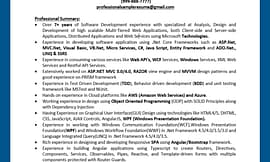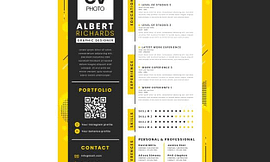Reading Lists
What Should a Data Scientist’s resume contain?
A Data Scientist resume is required to have a strong set of soft skills in order to be successful in their role. Some important soft skills for a Data Scientist include:
- Communication: Data Scientists need to be able to effectively communicate complex data analysis results and insights to a non-technical audience.
- Problem-solving: Data Scientists must be able to identify and solve complex problems using data.
- Collaboration: Data Scientists often work in teams, so they need to be able to work well with others and collaborate on projects.
- Adaptability: Data Science is a rapidly changing field, so Data Scientists need to be able to adapt to new technologies and methodologies quickly.
- Creativity: Data Scientists need to be able to think creatively in order to identify new patterns and insights in data.
- Attention to detail: Data Scientists need to be able to pay attention to detail in order to identify errors or inaccuracies in data.
- Technical skills: Data Scientists must have a good understanding of programming languages, data analysis and visualization tools, and machine learning frameworks.
- Business Acumen: A Data Scientist should be able to understand how their work impacts the business and how to use their insights to drive business decisions.
- Project management: Data Scientists need to be able to manage projects, set priorities, and meet deadlines.
- Storytelling: Data Scientists should be able to present data-driven insights in an engaging and compelling way, which is important in order to communicate the findings to the stakeholders and make them actionable.

Pro Sample Resume
Having a combination of both technical and soft skills is essential for a Data Scientist to be able to turn data into actionable insights and drive business decisions.
You may also read: How To Create Your Resume for Google: Tips and Advice
Creating a perfect Data Scientist resume involves a few key steps:
- Tailor your resume: Tailor your resume to the specific job you are applying for by highlighting the skills and experience that align with the requirements of the role.
- Use a clear and professional format: Use a clear and professional format that is easy to read and makes it easy for hiring managers to find the information they need.
- Highlight your education: Include your degree and any relevant certifications in data science or related fields.
- Showcase your work experience: Highlight any previous experience in data science, including any specific roles or responsibilities, such as data analysis, modeling, or machine learning. Be sure to mention any relevant skills, such as programming languages and tools used.
- Detail your technical skills: List your technical skills, including programming languages (e.g. Python, R, SQL), data analysis and visualization tools (e.g. Pandas, Matplotlib, Tableau), and machine learning frameworks(e.g. Tensorflow, sci-kit-learn, Keras).
- Highlight your projects: Highlight any data science projects you have worked on, including a brief description of the project, your role, and the technologies used.
- Include relevant publications and awards: If you have published any papers or articles in relevant data science journals or conferences, or have won any awards or honors for your work in data science, be sure to include them on your resume.
- Proofread your resume: Make sure your resume is free of errors and typos.
- Be concise: Avoid including irrelevant information or long paragraphs, and keep your resume to a maximum of 2 pages.
- Highlight your soft skills: Highlight any soft skills that are relevant to data science, such as communication, problem-solving, and teamwork.
Remember that a resume is a marketing tool and it should be able to sell your skills and qualifications to the employer and make a case for why you are the best candidate for the job.
you may also read: 3 Free Tools for Your Resume to Beat the ATS
Roles and responsibilities of Data Scientists:
Data Scientists typically have a variety of roles and responsibilities, which can include:
- Collecting, cleaning, and preparing data for analysis: Data Scientists need to be able to collect and organize large sets of data from various sources, and clean and prepare the data for analysis.
- Analyzing data and identifying patterns: Data Scientists use statistical and machine learning techniques to analyze data and identify patterns and insights.
- Building and testing predictive models: Data Scientists build and test predictive models, such as decision trees and neural networks, to make predictions about future events.
- Communicating results to stakeholders: Data Scientists need to be able to communicate their findings and insights to non-technical stakeholders in a clear and concise manner.
- Developing and implementing data-driven solutions: Data Scientists work with other teams to develop and implement data-driven solutions to business problems.
- Continuously monitoring performance and implementing improvements: Data Scientists monitor the performance of their models and systems and make improvements as necessary.
- Staying up-to-date with new technologies and methodologies: Data Scientists need to stay up-to-date with the latest technologies and methodologies in the field.
- Collaborating with other teams: Data Scientists often work with other teams, such as software engineers, product managers, and business analysts, to develop and implement data-driven solutions.
- Building and maintaining data pipelines: Data Scientists may also be responsible for building and maintaining data pipelines to ensure that data is properly collected, cleaned, and processed for analysis.
- Supporting and advising business decision-making: Data Scientists offer support and advice to business leaders to make data-driven decisions.
Data Scientist’s roles and responsibilities can vary depending on the organization, industry, and project they are working on. However, the core objective of a Data Scientist is to turn data into actionable insights that drive business decisions.
Data Scientist resume example







![Write An Incredible Resume [With Examples]](https://mly9jtuj6mmj.i.optimole.com/w:270/h:162/q:mauto/rt:fill/g:ce/f:best/https://professionalsampleresume.com/wp-content/uploads/2021/09/5-Golden-Rules-Write-an-Incredible-Resume.png)

